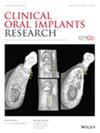氧化锆作为牙种植体最大限度地减少髓系先天免疫:一项在硅和体内的研究。
IF 5.3
1区 医学
Q1 DENTISTRY, ORAL SURGERY & MEDICINE
引用次数: 0
摘要
虽然钛传统上是行业标准,但氧化锆具有优越的物理和化学性能,值得进一步研究其临床疗效。本研究旨在研究氧化锆和钛种植体的免疫反应,强调氧化锆作为一种可行的替代方案的潜在优势。材料与方法本研究采用小鼠模型,在上颌无牙区放置两种钛和氧化锆种植体7天,比较两种种植体的免疫反应。在这段时间之后,分别从9只和45只小鼠身上采集种植体周围组织,在转录组学和细胞水平上评估骨髓免疫。结果我们的研究结果表明,与钛种植体相比,氧化锆种植体具有更好的生物相容性,转录组学数据显示骨髓细胞介导的炎症反应最小。具体来说,氧化锆植入物显著减少骨髓细胞的浸润和附着,特别是多形核中性粒细胞。此外,氧化锆植入物阻止巨噬细胞向炎性M1表型的极化,这在钛种植体周围组织中显著增强,从而促进巨噬细胞向再生M2表型的转变。结论氧化锆种植体可以减少炎症,促进愈合。本实验体内研究证明,与钛相比,氧化锆种植体在牙齿修复领域提供了更好的生物相容性解决方案。本文章由计算机程序翻译,如有差异,请以英文原文为准。
Zirconia Minimizes Myeloid Innate Immunity as Dental Implants: An In Silico and In Vivo Study.
AIM
While titanium has traditionally been the industry standard, zirconia presents superior physical and chemical properties that merit further investigation into its clinical efficacy. This study aims to examine the immunological responses associated with zirconia and titanium dental implants, emphasizing the potential advantages of zirconia as a viable alternative.
MATERIALS AND METHODS
This study compares the immune responses to titanium and zirconia implants using a murine model, in which two implants were placed in the maxillary edentulous region for 7 days. Following this period, peri-implant tissue was harvested from 9 and 45 mice to assess myeloid immunity at both the transcriptomic and cellular levels, respectively.
RESULTS
Our findings indicate that zirconia implants exhibit superior biocompatibility compared to titanium implants, evidenced by transcriptomic data showing a minimal myeloid cell-mediated inflammatory response. Specifically, zirconia implants significantly reduce the infiltration and attachment of myeloid cells, particularly polymorphonuclear neutrophils. Additionally, zirconia implants prevent the polarization of macrophages to the inflammatory M1 phenotype, which is markedly heightened in titanium peri-implant tissues, promoting instead a shift toward the regenerative M2 phenotype.
CONCLUSIONS
These results suggest that zirconia implants can minimize inflammation and promote better healing. This experimental in vivo study provides evidence that zirconia implants offer a more biocompatible solution in the field of dental restoration compared to titanium.
求助全文
通过发布文献求助,成功后即可免费获取论文全文。
去求助
来源期刊

Clinical Oral Implants Research
医学-工程:生物医学
CiteScore
7.70
自引率
11.60%
发文量
149
审稿时长
3 months
期刊介绍:
Clinical Oral Implants Research conveys scientific progress in the field of implant dentistry and its related areas to clinicians, teachers and researchers concerned with the application of this information for the benefit of patients in need of oral implants. The journal addresses itself to clinicians, general practitioners, periodontists, oral and maxillofacial surgeons and prosthodontists, as well as to teachers, academicians and scholars involved in the education of professionals and in the scientific promotion of the field of implant dentistry.
 求助内容:
求助内容: 应助结果提醒方式:
应助结果提醒方式:


